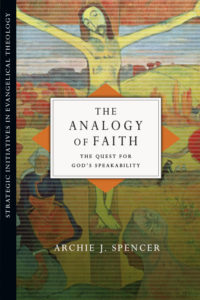
The Analogy of Faith: The Quest for God’s Speakability
Archie J. Spencer. The Analogy of Faith: The Quest for God’s Speakability. Downers Grove, IL: InterVarsity Press, 2015. pp. 445. $28.00 (paperback).
Reviewed by Michael Reed
One of the great ironies of modern theology is that in attempting to ensure we speak accurately about God we find ourselves with less and less to say. Can we have any confidence that human speech about God ‘reaches’ God in any meaningful or accurate way? Archie’s Spencer’s The Analogy of Faith: The Quest for God’s Speakability labors over this foundational question. His answer—to put it in simple and Barthian fashion—is that we cannot unless God in Christ shows us how. His monograph is meant to establish the preconditions for reliable human speech about God in a Christological “analogy of faith”—that is, in the correspondence between God and humanity enacted in Jesus Christ.
Spencer’s work is divided into five chapters, the first four of which provide historical overview and commentary for the concept of analogy, ranging from Plato the present day. In the first chapter, he identifies the cosmological assumptions in Platonic, Neoplatonic, and Aristotelian thoughts, which he delineates as a “Cause Effect Resemblance” (CER)—the idea that every effect bears some resemblance to its cause. In the second chapter, he argues that these assumptions make possible Aquinas’ “analogy of being.” Reliable human speech about the transcendent reality of God can be guaranteed by way of analogy, as long as one can safely maintain the ontological similarity and dissimilarity inherent within Creator and creation. This, Spencer seeks to argue, is both a difficult task and a shaky assumption. He argues that much of the confusion in later Catholic thought about analogy stems from Aquinas’ own inconsistent development of the term.
Chapters 3 and 4 respectively turn to Barth and Jüngel. These chapters present not only a quintessentially Protestant rejection of natural theology, but an interpretation of modern agnosticism and atheism as the inevitable result of a doctrine of God predicated upon the cosmological ontology of antiquity. Following Barth, Spencer argues that reliable speech about God must be sourced in the Word of God—i.e. in Christ as the “analogy of faith.” To do so, he looks to Barth’s doctrine of election, and holds forth against criticism that Barth’s concept of the analogia relationis becomes a kind of accidental “analogy of being.” His use of Jüngel allows him to extend the content of a Christological “analogy of faith” towards sociolinguistic applications, which serves to set up his final argument. Spencer’s fifth chapter contains his own contributions to the “analogy of faith,” in which Christ—as Word of God—is conceived of in terms of participation, performance, and parable, thus legitimating all three for analogical use in theological speech.
Spencer’s conclusions depend heavily upon the work of Karl Barth and Eberhard Jüngel; those not already predisposed towards Barth will find little new to love. A desire to speak towards a wider audience, both specialist and popular, means that the tempo and pacing of the work can a bit uneven. His journey through the history of major Christian discourses on analogy provides chronological breadth appropriate to a popular work, even while it addresses a question and genealogy of thought that likely appeals more to the specialist. Here, he devotes several hundred detailed pages to conceptions of analogy that he will comprehensibly reject. The admirable goal of introducing the reader to the full extent of debate runs up against the fact that the prose style, technical discussions, and philosophical terminology are largely unsuited to anyone not already familiar with the subject matter.
Set against this extensive historical backdrop, Spencer’s own conclusions seem, by contrast, to be far more quickly sketched. One might ask whether he understands his work to represent a further extension of the Christological applications of Barth and Jüngel’s work, or perhaps as a means of drawing connections between the existing Christology of these two thinkers and a larger evangelical tradition. That said, the book is a thorough and academic treatment of the theological uses of analogy. Spencer’s comprehensive treatment of his subject matter is a strong-point, as is his ability to appropriate Barth for evangelical audiences in order to bring greater richness to discussions of the doctrine of God.
Michael Reed, MDiv Student, Princeton Theological Seminary
